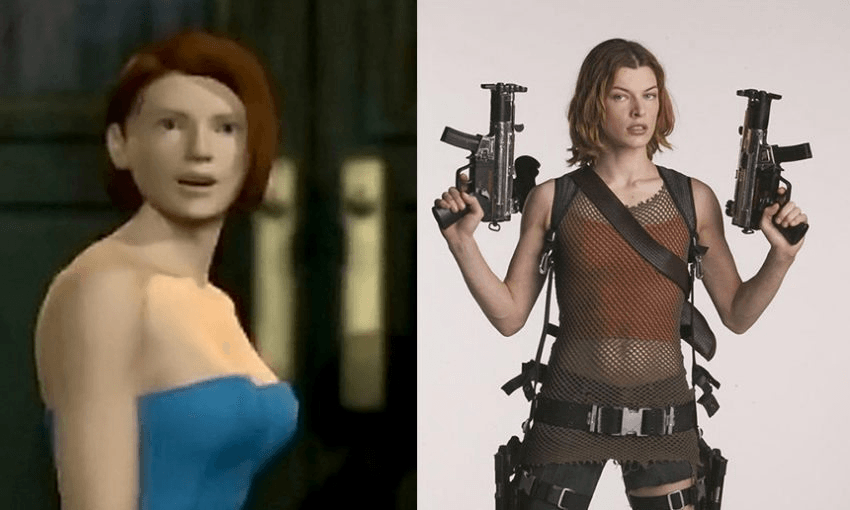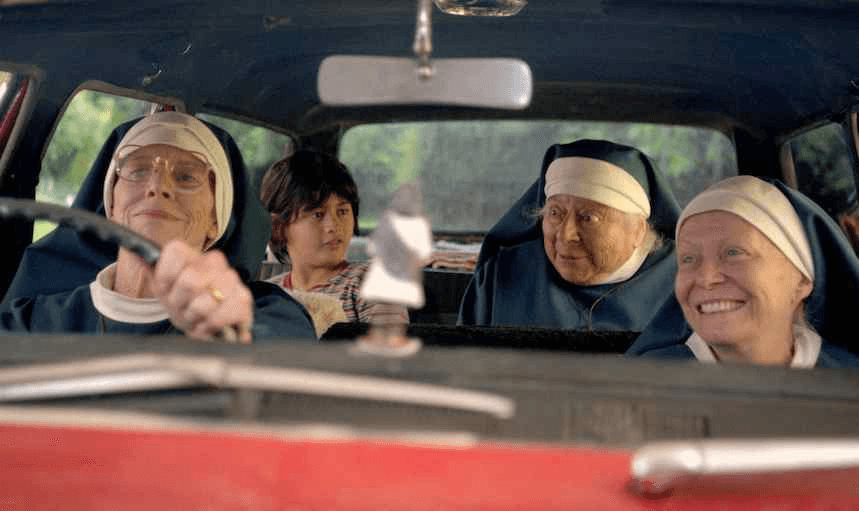It’s a mystery that deserves an answer. Alice, the protagonist of all six Resident Evil films, has not once made an appearance in the video games. This could not be by accident. To get to the bottom of this enduring riddle, Uther Dean interviewed* some of the key players in both the films and the video games.
This was originally published on March 2, 2017.
*Editor’s note: He didn’t really. He just used his imagination which, he claims, is almost as accurate as real interviews and much easier. And I’m like, dude, just file so I can make happy hour.
SHINJI MIKAMI, DIRECTOR OF SEVERAL RESIDENT EVIL GAMES: “When I started out making Biohazard [retitled Resident Evil in English speaking countries], I was sick of making games. I wanted to make films. But… it’s so hard to jump career tracks like that.”
MITCHELL PEMBERTON, VIDEO GAMES HISTORIAN: “With their locked off camera angles, deliberate pacing and their creation of the illusion of movement through the rapid presentation of multiple still images, the Resident Evil games have always been cinematic so it was no surprise when Constantin Films [makers of The NeverEnding Story] licensed the property in 2001.”
MIKAMI: “I was delighted. My cinematic vision would finally reach the screen.”
WALDFRIED BARTHEL, CO-FOUNDER, CONSTANTIN FILMS: “Paul WS Anderson was the obvious choice to direct the Resident Evil film. When you think of the modern classics – Soldier, Mortal Kombat, Alien Vs. Predator – you think Paul WS Anderson.”
PAUL WS ANDERSON, DIRECTOR OF FOUR RESIDENT EVIL FILMS, SOLE WRITER OF ALL SIX: “I’ve never been one to take the easy path. You can see that through my work. I’ve always got to give myself a little challenge. When I signed on to Resident Evil I decided that this time my restraint should be that I wouldn’t play the video games at all. I wanted to come to it fresh. I did, however, read the back of the box of the first one just to keep the suits off my back.”
MIKAMI: “I was not angry at what they did to Resident Evil… I was heart-broken.”
MILLA JOVOVICH, ‘ALICE’: “When I was preparing to play Alice [the lead character of all six films] for the first time, I asked myself a lot of questions. What is she? A human person. What does she do? Breathe oxygen. Does she have memories? No. Does she kick a dog? Yes.”
UTHER DEAN: “Was it a challenge when nearly every detail of your character’s personality and backstory was changed for each individual sequel?”
JOVOVICH: “…I don’t know?”
ANDERSON: “I intended Alice as a tribute to the video game industry. By not giving her a personality or agency, I was making her like a video game character. I thought that was obvious.”
MIKAMI: “Claire Redfield, Jill Valentine, Leon Kennedy. The leads of my games, I had done so much to flesh them out. To make them people but… He looked at all of that and said… No. He looked at my children and said… No.”
(over a minute of silence)
“That hurt me.”
PEMBERTON: The first Resident Evil film made a lot of money. It had everything that a 2002 audience wanted: giant tongue monsters, Michelle Rodriguez, Colin Salmon being cut into cubes. A sequel was assured from its opening weekend.”
ANDERSON: I was only writing and producing the second film. So I decided to let myself go a little wild and play one of the video games. I played Resident Evil Nemesis and it was a life-changing experience. This is what I had been wanting to make all along. When you look at my back catalogue of work you’ll see that most of them would have worked better as video games and that’s only partly because most of them are based on video games.”
MIKAMI: “We gave them a six-film license. That was a mistake.”
ANDERSON: “Finally I knew what I wanted to do with my life. I wanted to tell stories in video games. And I had the perfect opportunity. I would create characters and stories so compelling in the Resident Evil sequel that Capcom [the makers of the Resident Evil games] would have no option to adapt them into the games. I would shape Alice into the perfect video game protagonist.”
MIKAMI: “I saw what he was trying to do. It was so obvious. Putting Jill Valentine in the second film, putting the nemesis creature in the film. Suddenly, he wanted to be a part of our world – like that little mermaid in that film… you know… Lady in the Water. But after what he did… After he… Never would his vile deeds sully our world.”
ANDERSON: “When the next couple of games came out Alice was nowhere to be seen, so I decided to make my intentions a little clearer in the third film. I cast Iain Glen, the man who does the PEGI rating voiceover in trailers I’m ninety percent sure. A clear dog whistle to those in the video game know. I swapped out the character of Jill Valentine for Claire Redfield, also from the games, without any story logic, to send the message loud and clear that their characters were disposable and could be easily replaced by others.”
ALI LARTER, ‘CLAIRE’: “Shit, I was in a Resident Evil film? Wow. Yeah. That does sound like something I would do. Wait, I was in THREE of them?!”
ANDERSON: “People tell me that starting the fourth film with the Alice clones attacking and destroying Tokyo is a bit obvious but when I hear that I laugh and remind them that the fifth film is literally Alice making her way through previous scenarios from the films in virtual simulations that characters frequently relate directly to video games.
“I was over making sense, I was over being subtle. I just wanted them to connect with me. I just wanted them to understand what I was putting out here.”
MIKAMI: “You know when a child does a drawing of you and it’s so hideous that you should be offended but it bears so little resemblance to you that you can’t be offended at all. That’s what those films are like.
“That said, the slow mo reverse action scene beginning to the fifth film is legit bad ass.
”Soon, it was a joke. While our games have had ups and down, at least we have had ups. The films have been all but downs.
UTHER DEAN: “And you would say that to Anderson’s face?”
MIKAMI: “Yes.”
UTHER DEAN: “Did you?”
MIKAMI: “We have not spoken directly.”
UTHER DEAN: “Ever?”
MIKAMI: “…I have made myself clear.”
But a conversation between the two was to take place. It took weeks, but finally The Spinoff pulled enough strings and made enough ill fated promises to secure a a recording of the exchange. A transcript follows.
(A phone rings and is answered.)
MIKAMI: “Hello?”
ANDERSON: “Is this Shinji Mikami?”
MIKAMI: “Yes. Who am I speaking to?”
ANDERSON: “Paul Anderson. The director.”
(27 seconds of silence)
MIKAMI: “How did you get this number?”
ANDERSON: “That doesn’t matter. What matters is why… Why haven’t you put Alice in a game yet? I’m sick of sending you hints. Tell me the truth. I put all your characters in there… Wasn’t that enough? All I wanted was for you to immortalize Alice, my masterpiece, in a game. That’s all I wanted and you…
“Do you think I liked it? Making those films? Did you think I liked making those bizarre, inconsistent even within themselves films? No. It was painful for every moment. I know they’re not good. I know that… I just wanted you to notice her. I just wanted Alice to live and you… You never gave me that.”
MIKAMI: “Is this anything to do with the fact that Alice is played by your wife?”
ANDERSON: “She is? I’m married to Milla Jovovich?”
MIKAMI: “Yeah, I just googled it.”
ANDERSON: “Wow. Learn something new every day.”
MIKAMI: “To return to the subject at hand. I did know it hurt you, Mr Anderson. It was plain for all to see. For so long, I planned to include Alice in one of the games.”
ANDERSON: “Really? Thanks—“
MIKAMI: “Let me finish. I planned to include her but distort her beyond all recognisability! I was going to do to your child what you did to all of mine.”
ANDERSON: “What could you have done that would have been so bad?”
MIKAMI: “I was going to make her the very antithesis of herself. I was going to give her… motivation.”
(A muffled sob.)
ANDERSON: “What? No. You would never have. You monster. You wouldn’t have done something like that.”
MIKAMI: “I was ready. I was going to give her a memory and a motivation. I was even going to be consistent about her abilities and skills.”
ANDERSON: “You take that back YOU TAKE THAT BACK. Nothing I did was that bad. You’re talking about character assassination.”
MIKAMI: “But I didn’t, Paul. I didn’t do it. I decided to let you flail. I know I could have hurt you but it was all the more… delicious… to let you hurt yourself.”
ANDERSON: “But why?”
MIKAMI: “Because you hurt me first.”
ANDERSON: “What do you mean? I put your characters in. They’re just from a video game. What’s the big deal?”
(44 seconds of silence)
MIKAMI: “Just. Just from a video game. That is why.”
ANDERSON: “Look look look, don’t hang up. I’m really sorry. I’m so sorry. I… called you because I wanted to make you a deal.”
MIKAMI: “A deal?”
ANDERSON: “Let me tell you what my plan for the sixth film is.”
MIKAMI: “…go on.”
ANDERSON: “We start by saying the entire events of the previous film and a half were lies.”
MIKAMI: “What? Why?”
ANDERSON: “Let me finish. Then we bring back Iain Glen.”
MIKAMI: “But you killed him.”
ANDERSON: “And say he was in charge the whole time.”
MIKAMI: “But he definitely wasn’t.”
ANDERSON: “We make the zombies run.”
MIKAMI: “The zombies never ran before.”
ANDERSON: “Then we repeat the first film. They go back to the location of the first film.”
MIKAMI: “But you already did that in the third film.”
ANDERSON: “Yes and in the fifth too. And then we just repeat that whole film really.”
MIKAMI: “What but that… that sounds obscene. I mean… the previous films were at least dumb fun but this sounds…”
ANDERSON: “Say it.”
MIKAMI: “It sounds…”
ANDERSON: “Let me hear the words.”
MIKAMI: “Evil.”
ANDERSON: “Yes. It’s so bad that it might sink the whole name of Resident Evil. Here’s the deal.”
MIKAMI: “…Yes?”
ANDERSON: “Put Alice in a game or I make that film”.
MIKAMI: “That’s not a deal, that’s blackmail.”
ANDERSON: “That’s showbusiness. Choose.”
MIKAMI: “You ruin the whole franchise or I ruin the games. That’s no choice. I…”
ANDERSON: “There is no third option.”
MIKAMI: “We could make a really good game.”
ANDERSON: “Ha.”
MIKAMI: “We could release it at the same time.”
ANDERSON: “Ha! A good one? After Resident Evil 6 ?”
MIKAMI: “It’ll have VR and everything.”
ANDERSON: “You’re lying. That’ll never happen.”
MIKAMI: “Paul…”
ANDERSON: “Yes?”
MIKAMI: “That film. Will you like it?”
ANDERSON: “No. No one will.”
(Call ends.)
Resident Evil: The Final Chapter was released in cinemas on January 27, 2017. It has 33% on Rotten Tomatoes.
Resident Evil 7 was released for PlayStation 4, PlayStation VR, Xbox One and PC on January 24, 2017. It has 86/100 on Metacritic.
Alice dies at the end of Resident Evil: The Final Chapter.
She is still yet to appear in a video game.
This amazing and factually accurate oral history was brought to you by Bigpipe Broadband



